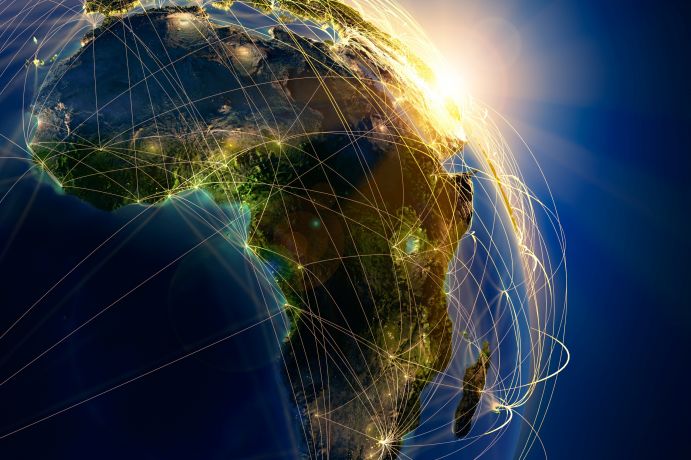Energy Research in Cooperation with Africa
Within its national hydrogen strategy, the Federal Ministry of Education and Research (BMBF) wants to make Africa a global player in the world energy supply. This would mean that states rich in solar and wind power could soon export green hydrogen all over the world and thus contribute to achieving the targets of the Paris Climate Agreement. At the same time, BMBF wants to secure a reliable and affordable energy supply for local areas in Africa. While Africa’s energy demand is increasing, large sections of its population still have no access to electricity.
As Germany will not be able to produce enough energy domestically to meet its energy demand in the long term, the German Federal Government aims to establish strategic partnerships with Africa. The idea is that states in Southern and Western Africa that are rich in solar and wind power will produce green hydrogen domestically and export it all over the world, including to Germany. Once it arrives in Germany, it will be used to heat residential areas and fuel industrial furnaces. Using power-to-X technologies, it will serve as a raw material in the chemical industry and as a reducing agent in the steel industry, as well as to power trains, buses, and trucks operated by fuel cells.
Sustainable Development Goals – SDGs
The African energy projects of the Federal Ministry of Education and Research address the United Nations' Sustainable Development Goal 7 (SDG 7), which aims to: "ensure access to affordable, reliable, sustainable and modern energy for all". The SDGs are global goals for sustainable development adopted by the United Nations. They serve as a road map for the future of all people worldwide.
To prepare this strategic partnership, BMBF currently funds an atlas of green hydrogen generation potentials. It is based on the WASCAL and SASSCAL science service centres initiated by the Federal Government (see info), which pool and strengthen the climate and energy research of more than 15 African countries.
The joint atlas of green hydrogen generation potentials will analyse which sites are suitable for setting up infrastructure for producing green hydrogen. Subsequently, pilot projects will aim to point out how to realize the economically efficient production, export, and distribution of green hydrogen. The pilot concepts will be set up in such a way that they improve the local situation on the one hand, while demonstrating how to realize an economically feasible supply chain for hydrogen on the other hand.
The second central goal of BMBF, in addition to hydrogen exports, is ensuring a reliable and affordable local electricity supply as more than half of the population in sub-Saharan Africa – around 600 million people – currently lack a modern energy supply.
In some rural areas, the supply of electricity is even lower and as much as 77 % have no access to electricity. This is one of several factors hampering the continent's economic advancement. Many companies have no choice but to use generators that are expensive and harmful to the environment. Even in private households, the African population still uses energy from the combustion of coal and biomass hazardous to the climate and health due to a lack of alternatives.
In this context, the generation and use of renewable energy offers opportunities to sustainably secure Africa's electricity supply. For this reason, the BMBF is funding a large number of projects that are intended to guarantee or stabilize the local electricity supply on the one hand and to provide on-the-ground solutions to further problems on the other. The BMBF projects focus primarily on the regions of Southern and Western Africa. In the WASTE2ENERGY project, for example, biogas plants are being developed that generate electricity from waste, which solves local waste problems, reduces the carbon footprint, and supports the local power grid.
Another example is the YESPV-NIGBEN project which, in addition to the issue of renewable energy production, also addresses the issue of how renewable energy can be used to preserve harvests by drying them. This prevents food waste and CO2 emissions from putrefaction processes.
What the energy projects of the BMBF have in common is that each of them involves African partners. In addition, the focus is on training African energy specialists. This is based on the idea that sustainable energy solutions for Africa can strengthen both the quality of life and the local economy. In the long term, this could reduce the pressure on the local people to leave their home country and provide them with new prospects.
The Southern African Science Service Centre for Climate Change and Adaptive Land Management (SASSCAL) is a joint initiative of Angola, Botswana, Namibia, South Africa, Zambia, and Germany. It develops solutions for challenges caused by global change processes such as climate change, demographic change, and economic change. In doing so, SASSCAL is conceptually and operationally designed to complement existing research infrastructures and initiatives in the region. Further information on SASSCAL
The West African Science Service Centre on Climate Change and Adapted Land Use (WASCAL) is a large-scale, research-focused service centre. It aims to enhance the societal adaptation to climate change, strengthen local research infrastructure and capacity in West Africa, and pool the expertise of ten West African countries with German support. WASCAL is funded by the German Federal Ministry of Education and Research and run jointly by West African and German partners. WASCAL cooperates with numerous authorities and universities in Germany and in the region to offer its partners an excellent knowledge platform. Further information on WASCAL
Last updated on




